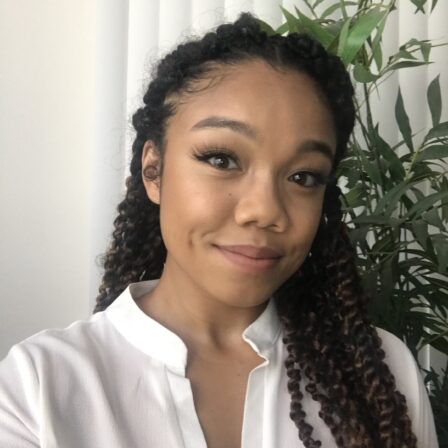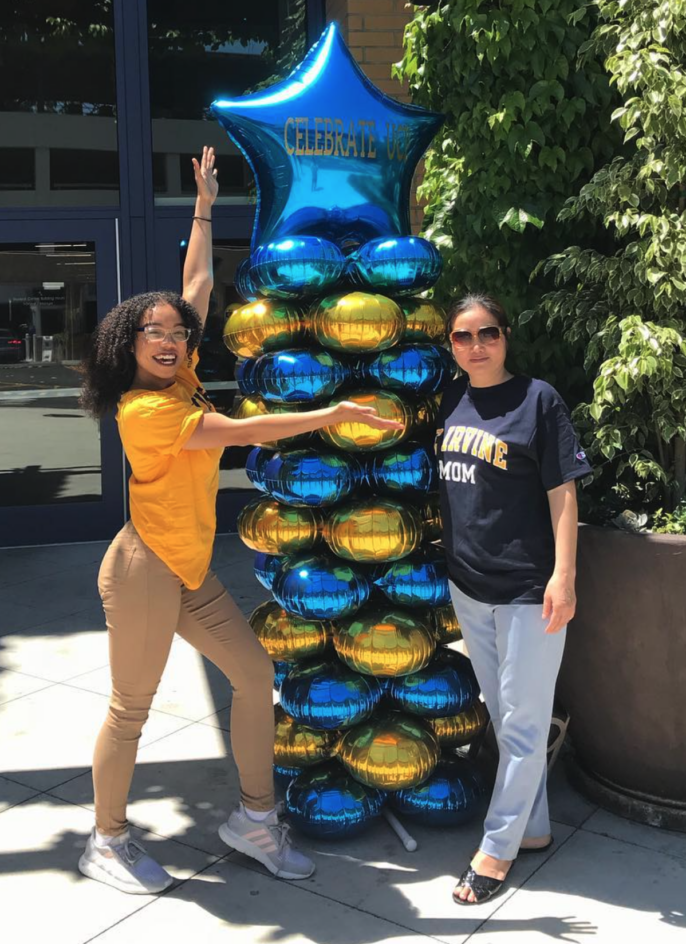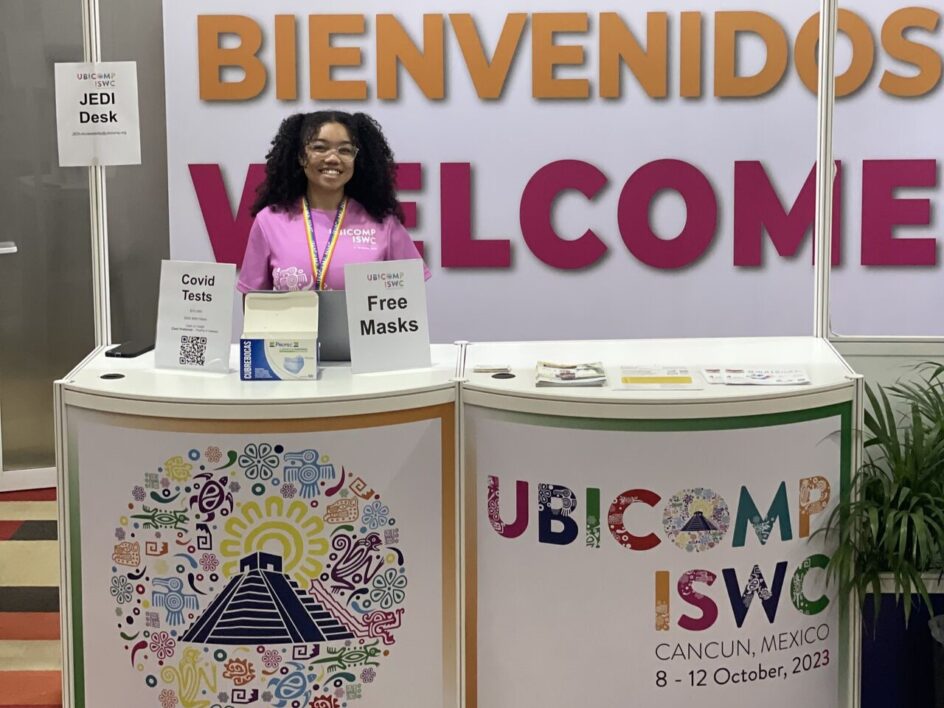Graduate Student Spotlight: Vitica Arnold’s Background in Psychology Informs Tech Design

In honor of Global Accessibility Awareness Day, recognized the third Thursday in May each year, Vitica Arnold talks about her research as an informatics Ph.D. student in UC Irvine’s Donald Bren School of Information and Computer Sciences (ICS). As a member of the Accessibility Research Collective (ARC) group, Vitica’s work explores how to design technology to better support people with cognitive disorders such as ADHD and Alzheimer’s Disease. With a bachelor’s degree in psychological science from UCI and experience conducting research in the Social & Technological Action Research (STAR) lab, Vitica shares what led to her interest in blending psychology and technology, and why everyone should care about digital accessibility.
What first sparked your interest in blending psychology and tech?
I earned my bachelor’s degree in psychological science — which, at the time, was called psychology and social behavior. I started at a community college and then transferred to UCI. I had a year and a half on campus, and then the pandemic happened, moving everything online. A lot of my coursework and research abruptly transitioned online, and we had to stop our clinical trials because we couldn’t be in person. So, I started thinking about how I could study people’s behavior with technology and social media. One of my first projects involved studying how people’s fear of missing out was facilitated through FaceTime and video technology applications. That’s when I first learned about “human computer interaction.”
Thinking about how we could transition our psychology background to study human behavior online is what introduced me to informatics and human computer interaction — which, I like to tell people, is a combination of psychology and technology. That’s when I decided to look up some research labs on campus, and I joined the STAR lab and started working with Dr. Jazette Johnson, helping with her accessibility research.
After I joined Jazette’s research, I applied to and participated in a tech incubator boot camp called Data Skills 4 All, focused on increasing diversity in the tech industry space. As a DS4A fellow, I learned data science techniques and amassed technical skills in Python, learning how to use SQL libraries and packages — Pandas, Matplotlib, NumPy and statsmodels — to create an interactive Tableau dashboard and Datafolio. This program is ultimately what gave me the technical confidence to apply for a Ph.D. in computing.

What motivated you to stay at UCI for grad school?
I felt like I just didn’t have enough time at UCI, and in the time that I was here, I made a lot of connections. As an undergrad, I started a student organization called MIX, which stands for multicultural interracial experience. It was a club for mixed students to come together and bond over their interracial identities. Through that organization, I connected with a lot of student leadership administrators, such as Dean Sherwyn Umali, and with other faculty like Dr. Adisa Ajamu of the Center for Black Culture, Resources, and Research and Dr. Sereseres of the Summer Academic Enrichment Program. I met a lot of people who helped shape me and encouraged me to pursue graduate studies before I even knew what that was. So, it prompted me to come back. Also, I’m from Orange County, so I wanted to stay local to my community and establish some roots here.
Can you also talk about your involvement with the STAR lab and ARC group?
I joined Dr. Jazette Johnson’s research project on the role of online social support for people living with Dementia and their caregivers, which was my first introduction to accessibility research. I really liked it, so I talked to Gillian Hayes, who runs the STAR lab, and I asked where else I could help. Then, during my gap year — after graduating from UCI but before applying to grad school — Gillian put me in touch with Dr. Franceli Cibrian at Chapman University, a STAR alum. That is where I got to work on my first project on the topic of ADHD, which is now my focus. We worked on designing technology for clinicians to help give a more accurate and efficient diagnosis for people with ADHD.
Then when I applied to UCI for grad school, I got in, but what’s funny is that I didn’t get matched with anyone in the STAR lab originally! Instead, I got matched with Dr. Anne Marie Piper and began my Ph.D. journey working with the ARC group, further developing my research into designing assistive technology for people with ADHD. During the second year, I re-joined the STAR lab and am now co-advised by Hayes and Piper. I already have a clinical research background, so now I’m venturing out a bit, looking at online communities with ADHD college students to see what kind of assistive or educational technology they’re using, and what I can create to help them achieve academic success.
What motivated you to explore this research area?
This topic stems from my experience as a first-gen college student. I didn’t even know about grad school or research until I transferred to UCI. All this kind of just came at me, but with that I realized how this opened so many doors for me. But it was also really hard, especially as someone with ADHD who has executive functioning challenges. There’s definitely a lot of invisible labor and extra work that you have to do to get to the same places as people who might not have these kinds of difficulties. Just because you can’t see a disability doesn’t mean people aren’t struggling. So that really inspired me to see how students with ADHD are surviving, what technology they’re using to achieve academic success, and how might that technology be further adapted to meet their specific needs.
And you served as a student accessibility volunteer at the 2023 UbiComp conference. How was that?
It was amazing. It was my first in-person conference and my first computer science and technology conference, so it was a lot of new things all at once. I learned so much. The person that was running it was from a school in the UK, where there are a lot more guidelines and safeguards for people who have disabilities and just for neurodivergent people in general.
For example, we’re familiar with people who have different sensory needs — we might have a quiet room for someone with autism who is over stimulated. But UK guidelines don’t limit it to just people with disabilities. They also use the quiet room for people who want to pray or for people who might just need a place to calm their thoughts; they don’t necessarily have a disability, but they need to stretch or move their body. It was nice to see how these spaces that were designed around people with disabilities were also being used for people who don’t have disabilities, so it normalized low-sensory, low-stimulation places, recognizing different sensory challenges that are not exclusive to people with disabilities.

Do you have any advice for prospective graduate students, particularly for first-gen students?
I’ll start with being first-gen. We often come from a working class background, and that makes us think that our worldview isn’t valuable. But in academia, our world view is extremely valuable! We bring a lot of new perspectives, and that’s a strength. So, for any first-gen students who feel like they don’t fit in, lean into where you came from. It’s going to help you overcome a lot of things.
And for all grad students, keep trying new things. Do the things that you have always wanted to do. Even if you’re not confident, just do it; don’t wait until you’re ready. That’s actually how I got a lot of my fellowships and research projects, just always saying yes to new opportunities.
Another thing is to really anchor into your community — both your academic community, connecting with faculty, but also people outside of academia. Find the people who will ground you and remind you why you’re here. I am an immigrant child too, which adds another layer of complexity. There are a lot of responsibilities, like translating and helping your parents figure out how to live in a country where they don’t speak the language, but it builds resilience and grit — and that resilience has helped push me in grad school.
What’s one thing you wish everyone better understood about accessible technology?
The first thing I learned in one of my accessibility classes is that accessibility is not exclusive to people with disabilities. Everyone will be “disabled” at some point in their life — whether it’s through a temporary injury or natural causes like aging — and these technologies will be there to support them. So, it’s really important that we invest in accessibility and disability studies because it does affect everyone, even if you are able-bodied.
— Shani Murray